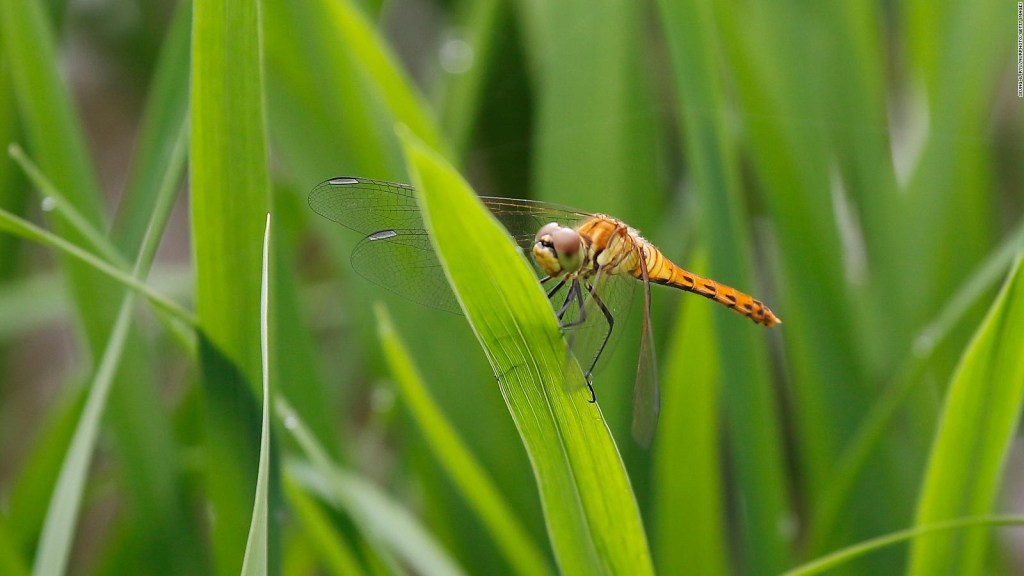How to protect nature during the pandemic?
2:33
(CNN) --
Overly intensive land use combined with warming temperatures is pushing insect ecosystems toward collapse in some parts of the world, scientists reported Wednesday.
The study, published in the journal
Nature
, identified for the first time a clear and alarming link between the climate crisis and highly intensive agriculture and showed that, in places where those impacts are particularly high, the abundance of insects has already decreased by almost a 50%, while the number of species has been reduced by 27%.
These results raise serious concerns, according to Charlotte Outhwaite, lead author of the study and a researcher at University College London, given the important role of insects in local ecosystems, pollination and food production.
The expert pointed out that the loss of insects could threaten human health and food security.
"We cannot feed 7.5 billion people without insects"
"Three-quarters of our crops depend on pollinating insects," Dave Goulson, professor of biology at the University of Sussex in the UK, had previously told CNN.
"Crops will start to fail. We won't have things like strawberries. We can't feed 7.5 billion people without insects," he summed up.
Outhwaite said his findings may "only represent the tip of the iceberg" due to the limited amount of evidence in some regions.
advertising
Butterflies and bees collect honey.
"But I think there are also a lot of consequences that we probably don't really know about because obviously there are a lot of different kinds of insects," Outhwaite told CNN.
"They do so many important things. We just don't have a clear idea of how dependent we are on them in certain situations," he remarked.
Tom Oliver, Professor of Applied Ecology at the University of Reading, said in a statement that scientists do not yet know when insect populations might reach a tipping point, at which point their losses would be too great to overcome.
"In terms of a potential tipping point where insect loss causes entire ecosystems to collapse, the honest answer is that we just don't know when the tipping point is," said Oliver, who was not involved in the study.
"We know you can't keep losing species without ultimately having a catastrophic outcome."
The expert likened the gradual loss to removing rivets from a plane, which cannot be done "without it eventually falling out of the sky."
The role of agriculture
The researchers defined high-intensity agriculture as one characterized by the use of chemical pesticides or fertilizers, low crop diversity, large field sizes, or high livestock density, among other things.
These are all relatively common features of today's agriculture.
And, according to scientists, too intensive land use has a combined effect with the climate crisis.
Bulldozing natural habitats for agriculture can drastically alter the local climate of an area and trigger extreme temperatures.
Researchers have detected substantial declines in insect populations in parts of the world that are much warmer, particularly in the tropics, where Outhwaite said he found alarming declines in insect biodiversity.
The researchers analyzed data over a 20-year period at more than 6,000 sites.
They studied almost 18,000 species of insects, including butterflies, moths, dragonflies, grasshoppers and bees.
Dragonflies are among the insects the researchers looked at.
The experts concluded that in areas with low-intensity agriculture, less climate warming, and close natural habitat, insects only decreased by 7%, compared to a 63% decrease in areas with less natural habitat cover.
Many insects rely on plants for shade on sweltering days, so the loss of nearby natural habitats could leave them more exposed and vulnerable to rising temperatures.
And as climate change progresses, scientists say these natural buffers could become less effective.
What can we do to avoid collapse?
Outhwaite explained to CNN that there are things we can do individually to help avoid this crisis, including planting more native species and wildflowers, reducing pesticide use in gardens and even limiting how often the grass is mowed. .
"And then thinking a little bit more broadly about protecting insects in other areas, it's probably a good idea to think about where the food that we're buying is coming from," Outwaite said.
"If they come from tropical countries, there's probably going to be a high impact on the biodiversity there."
He also noted that governments have an important role to play in recognizing the impact of trade and food production, and that they could try not to source food "from areas that are implementing deforestation."
While there is talk of climate crisis, deforestation in the Amazon grows 0:49
"I think now people are becoming more aware that biodiversity and insects in particular are in danger, but we haven't yet engaged them in the thoughts and thought processes" that would result in protective action, Outhewaite said.
A recent UN report on adaptation to the climate crisis underlines that the world's ecosystems are highly connected to human systems.
And unless the planet cuts heat-trapping emissions, those systems will continue to suffer huge biodiversity losses, especially from insects.
"The question of whether the remaining insects can continue to support functioning ecosystems or whether they will eventually be lost remains an open question," Oliver said.
"However, according to the precautionary principle, it would be best to act now so that we don't find out about ecosystem collapse when we experience it."

